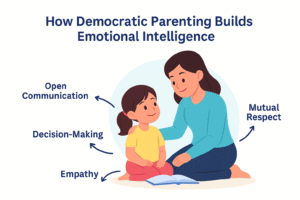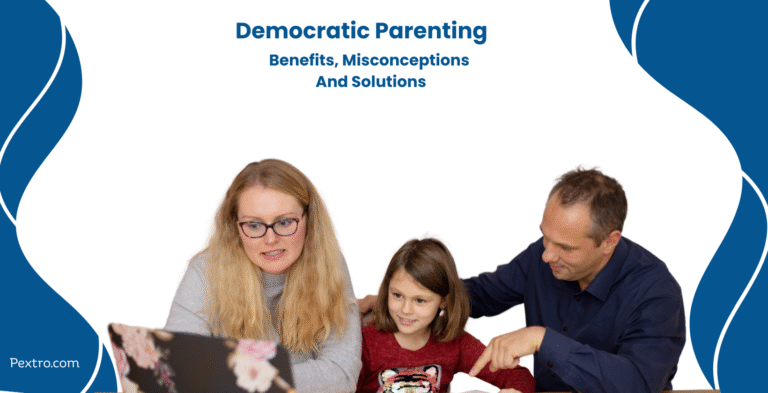What is Democratic Parenting?
Democratic parenting is a balanced approach that emphasizes mutual respect, open communication, and shared decision-making between parents and children.
Unlike authoritarian methods demanding strict obedience or permissive styles that lack boundaries, this parenting style offers structure and freedom.
Parents guide their children while nurturing independence, responsibility, and self-expression. In this child-centered method, children are given age-appropriate choices, and their opinions are valued, strengthening trust and promoting confident decision-making.
Core Principles of Democratic Parenting
The foundation of democratic parenting is built on four key principles:
1. Mutual Respect
Parents genuinely listen to their children’s thoughts and feelings, modeling respectful behavior and encouraging it in return.
2. Joint Decision-Making
Children are actively involved in setting rules and solving problems, building critical thinking and cooperation skills.
3. Encouraging Autonomy and Responsibility
Age-appropriate decisions are trusted to children, nurturing independence and accountability.
4. Positive Discipline Over Punishment
Rather than punishment, behavior is guided through understanding consequences and learning better choices.
How Democratic Parenting Differs from Other Styles
Understanding the contrasts highlights what makes this parenting style unique:
Democratic vs Authoritarian Parenting
Authoritarian parents expect obedience without input. Democratic parents involve children in decisions, fostering trust and mutual respect.
Democratic vs Permissive Parenting
Permissive parents are nurturing but often lack firm boundaries. Democratic parents balance warmth with clear expectations.
Democratic vs Neglectful Parenting
Neglectful parenting shows little involvement. Democratic parenting thrives on active communication and emotional connection.
Understanding how democratic parenting differs from authoritarian, permissive, and neglectful styles is essential.
➡️ Learn more about uninvolved (neglectful) parenting and its impact on children.
Why Democratic Parenting Stands Out
This approach blends firmness with flexibility, developing emotional intelligence, accountability, and resilience — essential qualities for success in life.
How Democratic Parenting Builds Emotional Intelligence

Children raised with this respectful style learn:
Empathy through open communication
Emotional regulation through decision-making experiences
Active listening and patience
Self-awareness and thoughtful behavior over impulsive reactions
These skills contribute to stronger relationships and lifelong success.
Real-World Examples of Democratic Parenting
Democratic parenting evolves with a child’s age:
Toddlers
Offer simple choices:
“Would you like the red pajamas or the blue ones?”
School-Age Children
Involve children in meal planning or setting household routines, encouraging responsibility.
Teenagers
Negotiate curfews together:
“What do you think is a fair curfew?”
At every stage, children experience decision-making within supportive boundaries.
Benefits of Democratic Parenting
This approach brings wide-reaching benefits:
Stronger Parent-Child Relationships: Trust and openness flourish.
Emotional Intelligence Development: Children understand and manage emotions effectively.
Improved Decision-Making: Participation strengthens critical thinking skills.
Increased Confidence and Independence: Children learn to trust their abilities.
Accountability Through Positive Discipline: Guidance fosters natural responsibility.
Common Misconceptions (and Truths)
“Kids can do whatever they want.”
Reality: Rules are clear, and children participate in creating them.
“It’s too soft.”
Reality: Respectful parenting maintains firm, consistent boundaries.
“Children won’t respect authority.”
Reality: Children experience authentic respect, strengthening their understanding of authority.
Challenges and How to Overcome Them
Setting Boundaries Without Being Overbearing
Solution: Establish essential, non-negotiable rules while offering freedom within limits.
Balancing Freedom and Responsibility
Solution: Expand autonomy gradually based on demonstrated responsibility.
Time and Patience
Solution: Embed decision-making naturally into routines, like regular family meetings.
Scientific Research Supporting Democratic Parenting
Research backs the effectiveness of this approach:
A Journal of Child Development study reports higher self-esteem, social competence, and academic achievement among children raised with this style.
The American Psychological Association (APA) highlights that emotional support combined with consistent boundaries strengthens emotional intelligence.
(External links: APA.org, Journal of Child Development)
Cultural Adaptations
Democratic parenting adapts across cultures:
In Western societies, individual negotiation and personal expression are emphasized.
In many Asian, African, and Middle Eastern communities, decision-making often considers collective family harmony.
This flexibility allows democratic parenting to fit various traditions while promoting mutual respect.
Real Parent Testimonials
Sarah, Mother of Two (Ages 6 and 9):
“Involving my kids in small decisions made our family life smoother and boosted their confidence.”
Ahmed, Father of a Teenager (Age 15):
“Negotiating house rules made my son more mature and responsible.”
Maria, Single Mother of a 4-Year-Old:
“Using positive discipline improved our bond—my daughter feels safer and opens up more easily.”
Tips for Parents Starting with Democratic Parenting
Start Small: Offer daily choices (snacks, clothes) to build independence.
Hold Family Meetings: Create regular spaces for open discussion.
Maintain Clear Boundaries: Consistent rules, flexible approaches where appropriate.
Practice Positive Discipline: Focus on natural consequences, not punishment.
Model Desired Behavior: Show daily examples of respect, patience, and empathy.
Frequently Asked Questions (FAQs)
What is the main goal of democratic parenting?
To nurture mutual respect, communication, and responsible decision-making.
How is it different from permissive parenting?
Democratic parenting balances freedom with clear boundaries, unlike permissiveness.
At what age can you start?
From toddlerhood, by offering simple daily choices.
Can it work with teenagers?
Absolutely — it builds trust, responsibility, and prepares teens for adulthood.
Does it mean giving up parental authority?
No — authority is maintained through collaboration and consistent rules.
Conclusion
Democratic parenting creates confident, emotionally intelligent, and responsible individuals.
By fostering mutual respect, clear boundaries, and open communication, this approach prepares children for a world that values empathy, resilience, and collaboration.
Though it requires patience and commitment, choosing democratic parenting lays the foundation for stronger families and future-ready generations.










